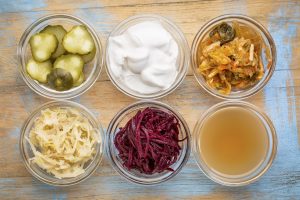 Probiotics are getting more press each and every day for their health benefits. From skin health, improving bone health, and of course, enhancing gut health, the possibilities seem endless. In fact, a recent study shows that combining a probiotic with breastfeeding in the first year of life can have improvements in the gut health of infants.
Probiotics are getting more press each and every day for their health benefits. From skin health, improving bone health, and of course, enhancing gut health, the possibilities seem endless. In fact, a recent study shows that combining a probiotic with breastfeeding in the first year of life can have improvements in the gut health of infants.
Basics of probiotics
Probiotics are simply any bacteria, fungi, or other living organism that has the potential to improve health to the host. The health of the body depends on a balance of different bacteria in the gut. An imbalance could lead to health problems such as gas, bloating, constipation, and other gut health issues. You can maintain a good balance of probiotics in the gut by consuming a diverse probiotic supplement every day. You can find good bacteria in fermented foods like yogurt, sauerkraut, or kimchi as well.
To feed such probiotics, it is important to consume plenty of fruits, vegetables, and healthy whole grains like oats or wheat bran. Prebiotic foods like these are important to maintain healthy levels of good bacteria. Together, probiotics and prebiotics can improve the health of the gut, immune system, and in turn overall health.
Breastfeeding and probiotics
A certain type of bacteria, known as Bifidobacterium infantis, is found naturally in the gut of infants upon birth. This bacterium helps to keep the gut healthy. It is usually in lower concentrations in the gut of babies from developed countries. This bacterium is nourished by breast milk from the infant’s mother, acting in the same way a typical prebiotic food would to a probiotic strain.
A study of mothers and breastfed infants looked at the effect of Bifidobacterium infantis supplements on infant’s gut health. One group of mothers and babies received the supplement with lactation support from day 7 to 21 after birth. Meanwhile, the other group received only lactation support. Study results show that those given the probiotic had positive changes in the make-up of the infant feces for up to a year after treatment. During this year, the “good” bacteria crowded out “bad” bacteria linked with asthma, allergies, and other immune-related diseases. This study suggests that this probiotic, upon further study, could help prevent immune-related diseases in babies from developed countries.
Which probiotic should I take?
There are so many types of probiotics on the market today. This can make it confusing to know which one to choose. Every probiotic strain has its unique benefits, so you may want to do your research before choosing one. A qualified alternative healthcare provider, such as a naturopath, may be able to assist you in making your choice.
Regardless of which strains you choose, a diverse group of strains is recommended. Diversity of bacteria is important to help your gut create a balanced population. Also, a capsule or other medium will allow optimal survival of the bacteria as it travels to your gut. One example of a high quality probiotic is Biovia 30 by Vita Sciences. This probiotic contains 30 billion colony forming units of bacteria and 10 different strains. Furthermore, Biovia 30 can help boost the immune system and improve digestive health with regular use.
-written by Staci Gulbin, MS, MEd, RD, LDN
References:
Healthline (accessed July 31, 2018) “The 19 Best Prebiotic Foods You Should Eat.”
Nagpal, R., et al. (2012) “Probiotics, their health benefits and applications for developing healthier foods: a review.” FEMS Microbiology Letters, 334(2012): 1-15.
National Center for Complementary and Integrative Health (accessed May 17, 2018) “Probiotics: In Depth.”
Science Daily (June 9, 2018) “Bifidobacteria supplement colonizes gut of breastfed infants.”

 reflux occurs for twice a week for more than a few weeks. Uncontrolled GERD can lead to respiratory problems or conditions such as esophagitis, which is an inflammation of the esophagus.
reflux occurs for twice a week for more than a few weeks. Uncontrolled GERD can lead to respiratory problems or conditions such as esophagitis, which is an inflammation of the esophagus.